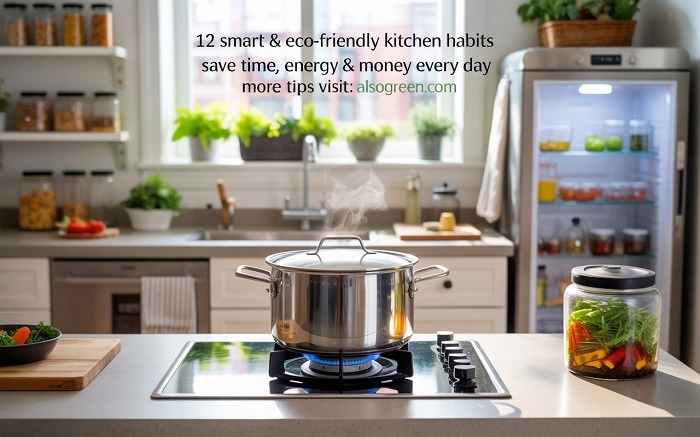12 Smart & Eco-Friendly Kitchen Habits That Save Time, Energy, and Money Every Day
Learn easy kitchen habits that reduce food waste, lower energy bills, and make your cooking space more organized, sustainable, and budget-friendly.


12 Smart & Eco-Friendly Kitchen Habits That Save Time, Energy, and Money Every Day
Your kitchen is the heart of your home, but it's also where a lot of waste, mess, and stress can pile up. If you feel like you're constantly cleaning, cooking, or searching for things, you're not alone. Many of us don't realize how simple, eco-friendly changes can make life easier, save money, and protect the planet.
This guide shares 12 practical and eco-friendly kitchen habits that help you save time, energy, and money while creating a more sustainable home. Whether you're a busy parent, college student, or someone just looking to live greener, these tips are easy to adopt starting today.
1. Cover Your Pots While Cooking
Using a lid helps food cook faster by retaining heat. This simple habit reduces cooking time and energy use. Next time you're making pasta, soup, or rice, cover the pot to keep the ingredients warm.
Why it matters: Less energy used = lower bills and fewer carbon emissions.
2. Skip Preheating When Possible
Not every recipe needs a preheated oven. Skipping preheating can save energy, especially for casseroles or frozen foods. Always check the recipe—if it doesn't specifically say to preheat, it might not be necessary.
Eco tip: Preheat only when baking breads or pastries that depend on precise temperatures.
3. Organize Your Fridge to Reduce Food Waste
A disorganized fridge can lead to forgotten leftovers and spoiled food. Try the "First In, First Out" method: keep older food at the front and newer items in the back.
Use clear containers and label everything with dates. It'll help you plan meals more efficiently and waste less.
Bonus tip: Clear bins and labels make it easier for everyone to find what they need.
4. Store Food Properly to Keep It Fresh Longer
Improper food storage leads to unnecessary waste. Store herbs in jars of water like flowers. Wrap greens in a paper towel to absorb moisture. Freeze leftovers before they go bad.
Result: Less spoiled food means more savings and less trash.
5. Unplug Appliances That Drain Energy
Appliances like toasters, coffee makers, and microwaves consume power even when they're off—this is known as a "phantom load."
Use a bright power strip or unplug these devices when not in use. Over time, this results in real energy savings.
Bright tip: Timed smart plugs can automatically turn off devices.
6. Run the Dishwasher Efficiently
Please wait until the dishwasher is full before starting it. Use the eco or light cycle if available. Skip rinsing—scrape off leftover food.
Energy-saving kitchen hack: Run it at night during off-peak hours to save even more.
7. Use Non-Toxic, Eco-Friendly Cleaners
Most conventional cleaners contain harsh chemicals. Switch to natural options, such as vinegar, baking soda, and castile soap.
Choose brands that offer refillable or concentrated cleaners to reduce plastic waste.
A cleaner home + cleaner Earth = better living.
8. Ditch Paper Towels for Reusable Cloths
Paper towels are convenient but wasteful. Keep a basket of washable cloths or cut-up old T-shirts for cleaning spills and wiping counters.
Simple swap: Microfiber cloths are highly absorbent and long-lasting.
9. Declutter Your Kitchen Tools
Too many gadgets create chaos. Go through your drawers and donate what you don't use. Keep essentials easy to reach.
Use drawer organizers and small bins for better storage. A tidy kitchen is faster to clean and more fun to cook in.
10. Create a "Use-It-Up" Shelf
Dedicate a section of your fridge or pantry to foods that need to be eaten soon. Plan meals around those items once a week.
Try this: Make soups, smoothies, or stir-fries using older produce and leftovers.
11. Reuse Glass Jars for Storage
Instead of throwing away jars, clean and reuse them. They're great for storing spices, grains, and snacks. Plus, they're plastic-free and look great on your shelves.
Pro tip: Add labels for easy identification.
12. Start a Countertop Compost Jar
Keep a small bin or jar on your counter for compostable scraps, such as vegetable peels, eggshells, and coffee grounds. Once complete, transfer it to an outdoor compost bin or a local drop-off location.
Why it matters: It reduces landfill waste and creates healthy soil.
Final Thoughts
These small, sustainable kitchen habits are easy to adopt and have a significant impact over time. You'll save time, cut down on waste, and lower your energy bills.
Living a greener life doesn't mean doing everything perfectly; it means making conscious choices. Start with just one new habit—maybe unplugging your toaster or labeling leftovers. Before long, these changes will become second nature.
Get inspired: Subscribe to our newsletter for weekly tips, eco-product picks, and zero-waste ideas.
Frequently Asked Questions
Q: How can I make my kitchen more eco-friendly on a budget?
A: Start with affordable changes like switching to reusable clothes, making homemade cleaners, and organizing your fridge to reduce food waste.
Q: What are the most common energy-wasting habits in the kitchen?
A: Running half-full dishwashers, preheating ovens unnecessarily, and leaving appliances plugged in are big energy wasters.
Q: What should I avoid putting in my compost bin?
A: Skip meat, dairy, oily foods, and pet waste. Stick to veggie peels, coffee grounds, and eggshells.
Q: How can I organize my kitchen to reduce waste?
A: Use labeled jars, create a "use-it-up" shelf, and store older food upfront to avoid spoilage.
Q: Are eco-friendly cleaning products worth it?
A: Yes! They're safer for your health and better for the planet, and many come in refillable packaging to cut plastic waste.
Also Green
Embrace a mindful and eco-friendly lifestyle today.
Contact
contact@alsogreen.com
© 2025 Also Green. All Rights Reserved
+14706521930
